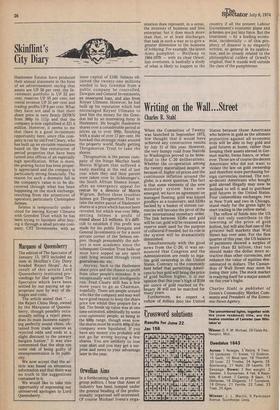Skinflint's City Diary
Haslemere Estates have produced their annual statement in the form of an advertisement saying that assets are UP 50 per cent, the Investment portfolio is UP 52 per cent, reserves UP 55 per cent, net rental revenue UP 33 per cent and trading profits UP 6 per cent. What they have not said is that their share price is very firmly DOWN from 360p to I I lp and that the company is now capitalised at £21.4 million. However, it seems to me that there is a good investment • opportunity here, since this company is run by old Fred Cleary, who has built up an enviable reputation based on the fine restoration of period properties that have been turned into offices of an especially high specification. What is more, the gearing factor has been properly appreciated and the company is particularly strong financially. The reason for such a dramatic fall in the company's value is to be discovered through what has been happening on the stock exchange, resulting from the attentions of operators; particularly Christopher Selmes.
Selmes is temporarily under a cloud for leaving Keyser Ullmann with Grendon Trust which he has been trying to liquidate after buying it through a small private company, CST Investments, with an issue capital of £100. Selmes obtained the twenty-one millions needed to buy Grendon from a public company he controlled, Dowgate and General Investments, an unsecured loan, and also from Keyser Ullmann. However, he had built up his reputation which had encouraged Keyser Ullmann to lend him the money for the Grendon bid by an interesting foray in Haslemere. He bought Haslemere shares over a considerable period at prices up to over 300p, finishing with a stake of over 17 per cent. He hawked this strategic stake around the property world, finally getting Throgmorton Trust to take the shares.
Throgmorton is the parent company of the fringe Mayfair bank Morris Wigram that suffered a nasty mauling at the end of last year when they and their parent were taken over by Schlesinger's, the South African finance house, after an emergency appeal for rescue by a director of Morris Wigram. Before these troubles Selmes got Throgmorton Trust to take the entire parcel of Haslemere shares at a price which has not been revealed, but which was over 300p, netting Selmes a profit of round about 2.5 millions. It's difficult to establish if this profit was made for his public Dowgate and General Investments or for a more private corner of the Selmes empire, though presumably the subject is now academic since the subsequent Grendon Trust balls-up must have sopped up any spare cash lying around through cross guarantees etc. etc.
Anyway, back to the Haslemere share price and the chance to profit from other people's mistakes. It is exceptionally well and intelligently run. Fred Cleary still has a few more years to go as Chairman, hopefully. There are people around who like the company and may well have good reason to keep the share price low whilst they prepare for a bid. The break up value was at one time estimated, admittedly by some over-optimistic people, as being in the 600p range, though even now the shares must be worth 400p if the company were liquidated. If you have any money you probably will not go far wrong buying a few • shares. You are unlikely to lose your shirt and you may get a surprise and news to your advantage later in the year. nisation does represent, in a sense, the interests of business and free enterprise; but it does much more than that, or at least discharges that task in such a way as to give a greater dimension to the business of lobbying. For example, the latest Aims pamphlet — Halfway to 1984-1979. — with its clear Orwellian overtones, is basically a study of what is likely to happen to the country if all the present Labour Government's economic plans and schemes are put into force. But the treatment — by a leading economist, incidentally — of this prophecy of disaster is so elegantly written, so general in its application, and so closely related to the philosophical calibre of Orvvell's original, that it stands well outside the class of the pamphleteer.


































 Previous page
Previous page